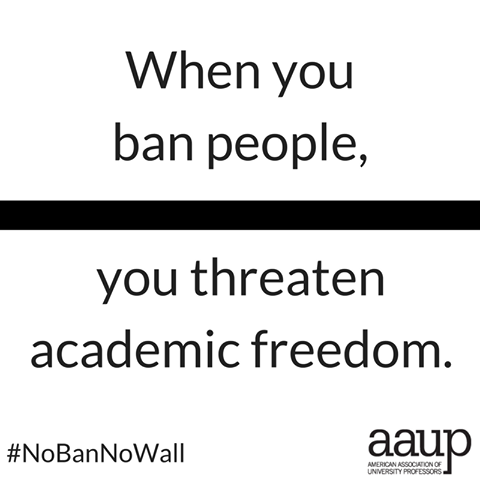AAUP
March 6, 2017
It’s still a ban. It’s still exclusionary. It’s still aimed at Muslim-majority countries. And it still has a chilling effect on academic freedom and the movement of people and ideas.
Under the new travel ban signed today, people from Iran, Somalia, Sudan, Yemen, Syria, and Libya will face a 90-day ban on entering the United States. This despite a leaked Homeland Security draft report from last week that said that citizenship is an “unlikely indicator” of a threat and the fact that there are already stringent vetting procedures in place for people seeking visas to enter the US.
Those being excluded from the US will doubtless include faculty and students who seek to travel here to speak, participate in conferences, or conduct other academic work. Their exclusion is at odds with fundamental AAUP principles and with our nation’s historic commitment to the free exchange of ideas.
The AAUP is planning to join the legal fight that will follow this new ban. Indeed, we have a long history of legal action in this arena. In 2006, we joined the American Academy of Religion and the PEN American Center in a suit contesting the exclusion of Tariq Ramadan, a scholar who accepted a tenured position at the University of Notre Dame only to have the government revoke his visa, apparently on the basis of what is known as the ideological exclusion provision of the USA Patriot Act.
The same year Adam Habib, a scholar coming to meet with officers of the Social Science Research Council, Columbia University, the National Institutes of Health, and the World Bank was intercepted at the airport and denied entry to the United States, based on a portion of the USA Patriot Act excluding aliens who have “engaged in a terrorist activity.” The government did not, however, provide any evidence for its determination that Habib had engaged in terrorist activity or define the type of activity in which he had supposedly engaged. The AAUP joined the ACLU in filing suit on behalf of the AAUP and other organizations that had invited Habib to speak in the United States.
Academic freedom eventually prevailed in those cases--the bans on entry for both men were lifted in 2010--and it will prevail again, though the fight will not be quick or easy.
When you ban people, you threaten academic freedom.
Download a sign here to post on your office door or in your classroom.

